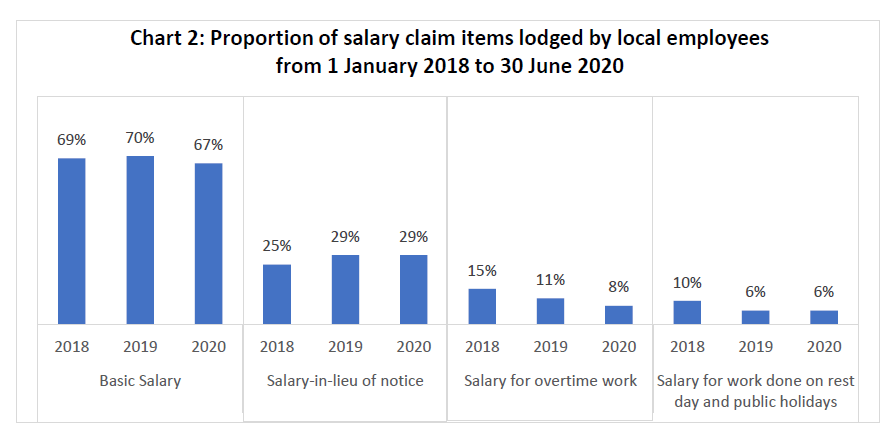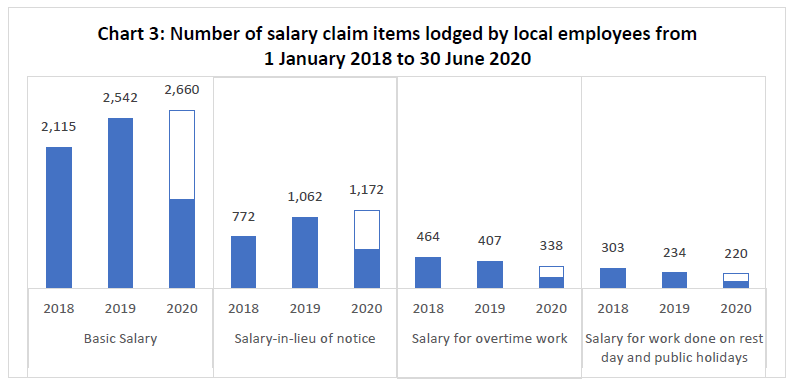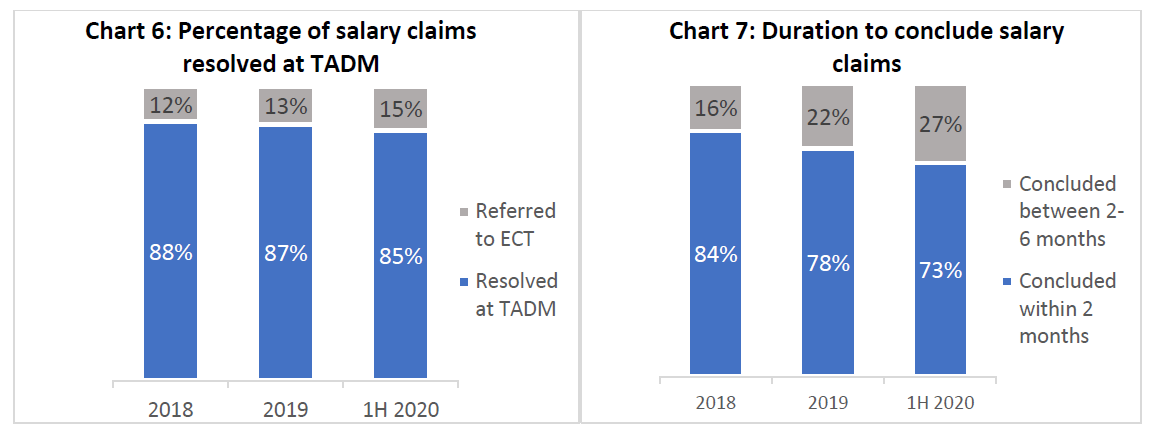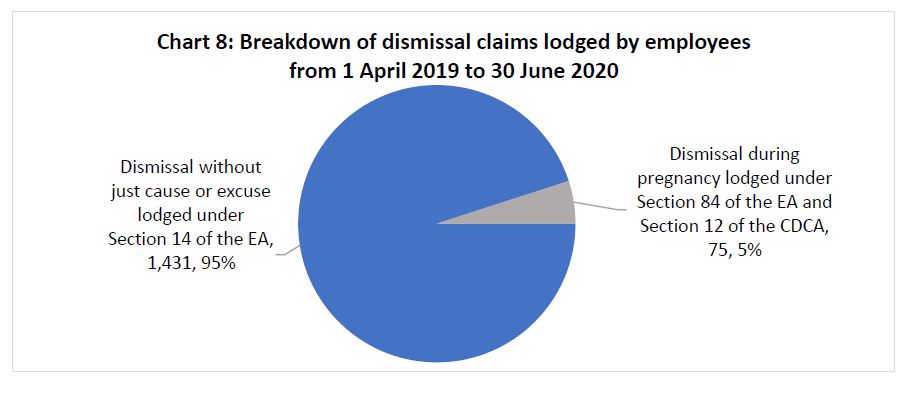Human Resources Online is on Telegram! Follow us @humanresourcesonline or click here for all the latest weekly HR and manpower news from around the region.
share on
At the same time, a total of 1,506 dismissal claims were lodged between April 2019 and June 2020, of which 71% were concluded within two months.
Singapore recorded an increase in salary claims among local employees in 2019 and H1 2020, a new report by the Ministry of Manpower (MOM), Tripartite Alliance for Dispute Management (TADM) and Tripartite Alliance for Fair and Progressive Employment Practices (TAFEP) has found.
According to the Employment Standards Report 2019/2020, which covers the period from 1 January 2019 to 30 June 2020, there were 1.53 salary claims per 1,000 employees in 2019, up from 1.43 in 2018. This was partly driven by an increase in claims from the wholesale and retail trade industry, in line with its weak performance in 2019.
As for H1 2020, the annualised salary claims recorded per 1,000 employees stood at 1.73, higher than both 2019 and 2018, mainly due to the economic disruptions of COVID-19. Per the report, about 40% of all salary claims lodged by local employees came from the services industries, which were severely impacted by the pandemic.
Breaking down the types of salary claims made - a larger proportion was related to basic salaries (70% in 2019, 67% in 2020), followed by salary-in-lieu of notice (29% in 2019 and 2020); while the lowest proportion were for salary for work done on rest days and public holidays (6% in 2019 and 2020).


More salary claims were lodged by foreign employees in 2019, but this dropped in H1 2020
Coming to foreign employees, a total of 4.98 salary claims were made per 1,000 employees in 2019, up from 4.45 in 2018. According to the report, this was partly attributed to more group claims among foreign employees in the construction sector. In particular, there were 134 construction employers with at least five claims involving foreign employees in 2019, up from 116 in 2018.
That said, a drop in annualised salary claims was observed in H1 2020, at 3.96 per 1,000 foreign employees, driven by a significant drop in the number of claims lodged by foreign employees in the construction sector.
Similar to what was observed for local employees, basic salary claims made up the largest proportion for foreign employees (93% in 2019, 88% in 2020), followed by claims for overtime pay (67% in 2019, 51% in 2020).
On the other hand, a lower proportion was due to claims for salary-in-lieu of notice, at 6% in 2019 and 13% in 2020.


Overall, despite the above findings, the report noted that the incidence of salary claims remained low, albeit making up a large majority of employment claims (86%) from 1 January 2019 to 30 June 2020 (13,591 salary claims, out of 15,717 employment claims).
90% of employees fully recovered their salaries owed
The percentage of salary claims resolved at TADM remained "fairly stable" in 2019 and H1 2020, compared to 2018. However, the percentage of salary claims concluded within two months decreased since 2018. This was partly due to an increase in the number of employment disputes involving group claims and more employers facing financial difficulties, the report noted.
Of the salary claims lodged in the period, 90% of employees successfully recovered their salaries fully at TADM or the Employment Claims Tribunals (ECT). About half of the remaining employees partially recovered their salaries. The total recovered sum amounted to about S$23mn.

Significantly more dismissal claims were lodged in Q2 2020, vs previous quarters
Following amendments to the Employment Act which extended coverage of wrongful dismissal claims to all employees, beginning 1 April 2019, the adjudication of wrongful dismissal claims under the EA and Child Development Co-Savings Act (CDCA) was also shifted from MOM to the Employment Claims Tribunal.
A total of 1,506 dismissal claims were then lodged under the amended Employment Act and Child Development Co-Savings Act between 1 April 2019 and 30 June 2020, the report highlighted. Of the 1,431 lodged under Section 14 of the EA, 23% (333) were by managers and executives who were not previously covered by the Act.
At the same time, 2% (or 26) of claims under the EA are still pending mediation by TADM, while 286 (or 20%) were either privately settled or withdrawn.


Zooming into specific quarters, a "significant increase" in dismissal claims were recorded in Q2 2020, in tandem with the decline in local employment. Despite the increase, the report noted there was no evidence that more employers terminated their employees unfairly to deny them of retrenchment benefit. The absolute number of claims for retrenchment benefit remained low at 69 claims in Q2 2020.
Instead, many of the dismissal claims in that quarter were lodged by employees who were unhappy over the abrupt manner of termination (due in part to restrictions in face-to-face meetings during the Circuit Breaker), rather than failure to fulfil their contractual obligations.
In light of this, TADM has advised employers to take steps to prevent such avoidable unhappiness and disputes. "Employers should always be clear in their communications and be sensitive to the emotions of their employees when exercising contractual termination.
"In cases where workers were retrenched instead of contractually terminated, the updated Tripartite Advisory on Managing Excess Manpower and Responsible Retrenchment (with effect from 17 October 2020) specifically addresses this point, by calling on employers to ensure their retrenchments are carried out in a respectful manner, and with compassion, including the manner in which the affected employees are notified and the type of support they receive thereafter."
72% of dismissal claims were concluded within two months
Of the dismissal claims lodged between 1 April 2019 and 30 June 2020, 72% were concluded within two months, with the complex claims concluding between two and six months, and the total payment by employers to employees amounted to S$1.4mn.
More than 7,300 workplace inspections were carried out between January 2019 and June 2020
Between January 2019 and June 2020, MOM carried out more than 7,300 proactive inspections of workplaces to ensure some 52,400 employees received their employment dues, such as prompt payment of salary and payment for overtime, work done on rest days and public holidays at the correct rate of pay.
To help employers who did not "wilfully" breach employment laws and were non-compliant largely because they overlooked the requirement to keep proper work hour records, especially with respect to the calculation and payment for overtime work, MOM required them to attend corrective clinics on the EA to better understand their obligations and improve their employment practices.
A total of around 600 employers attended these clinics in this period, with more than nine in 10 subsequently rectifying their practices. The remaining employers were required to correct their practices, and enforcement action was taken according to the severity of the claim.
Over 1,200 employers have been scrutinised for fair hiring since 2016, with 3,200 EP applications rejected/withheld
Since 2016, more than 1,200 employers have been scrutinised under the Fair Consideration Framework, according to a separate feature in the report. In all, 3,200 Employment Pass (EP) applications by these employers have been rejected or withheld by MOM, or withdrawn subsequently. On the other hand, employers on the FCF Watchlist have hired more than 4,800 Singaporean PMETs.
Apart from that, in H1 2020, TAFEP looked into about 260 cases of possible discriminatory hiring practices, up from about 160 for the same period in 2019. Substantiated cases were referred to MOM for investigations and enforcement. Within that period, MOM had curtailed the work pass privileges of about 70 employers for discriminatory hiring practices, a significant increase from 35 employers in the full year of 2019.
Commenting on these findings, Patrick Tay, Assistant Secretary-General of NTUC, said in a Facebook post: "The issue of discriminatory hiring continues to be something we must constantly pay close watch to. On top of existing penalties, the Government could also rescind preferential tax benefits from companies that continue unfair recruitment practices and disallow them from winning public sector contracts or publish the names of recalcitrant firms that repeatedly fail to show concerted efforts to strengthen the Singaporean Core."
Photo / Screenshot from report
share on


